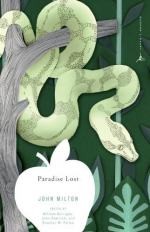|
This section contains 8,656 words (approx. 29 pages at 300 words per page) |

|
SOURCE: “Eve and the Arts of Eden,” in Milton and the Idea of Woman, edited by Julia M. Walker, University of Illinois Press, 1988, pp. 100-19.
In the following essay, McColley argues that for Milton, Eve is the embodiment of poetry, as “she personifies poesy in her work, in the imagery associated with her, and in the method of her vocation.”
Near the end of Book 4 of Paradise Lost, we come upon a multilayered image. Innocent Adam and Eve, in the innermost, flower-decked, awe-encircled bower, sleep in one another's arms. Squatting by Eve, Lucifer turned Satan turned toad pours poison into her ear in the form of “Vain hopes, vain aims, inordinate desires / Blown up with high conceits engend'ring pride.” Standing over Satan, the archangel Ithuriel, searcher-out of truth, touches him “lightly” with his spear, causing him literally to be “blown up”—as is fitting for the father of...
|
This section contains 8,656 words (approx. 29 pages at 300 words per page) |

|


